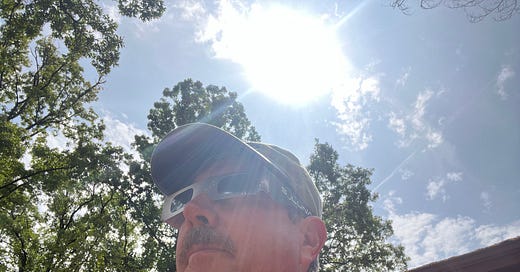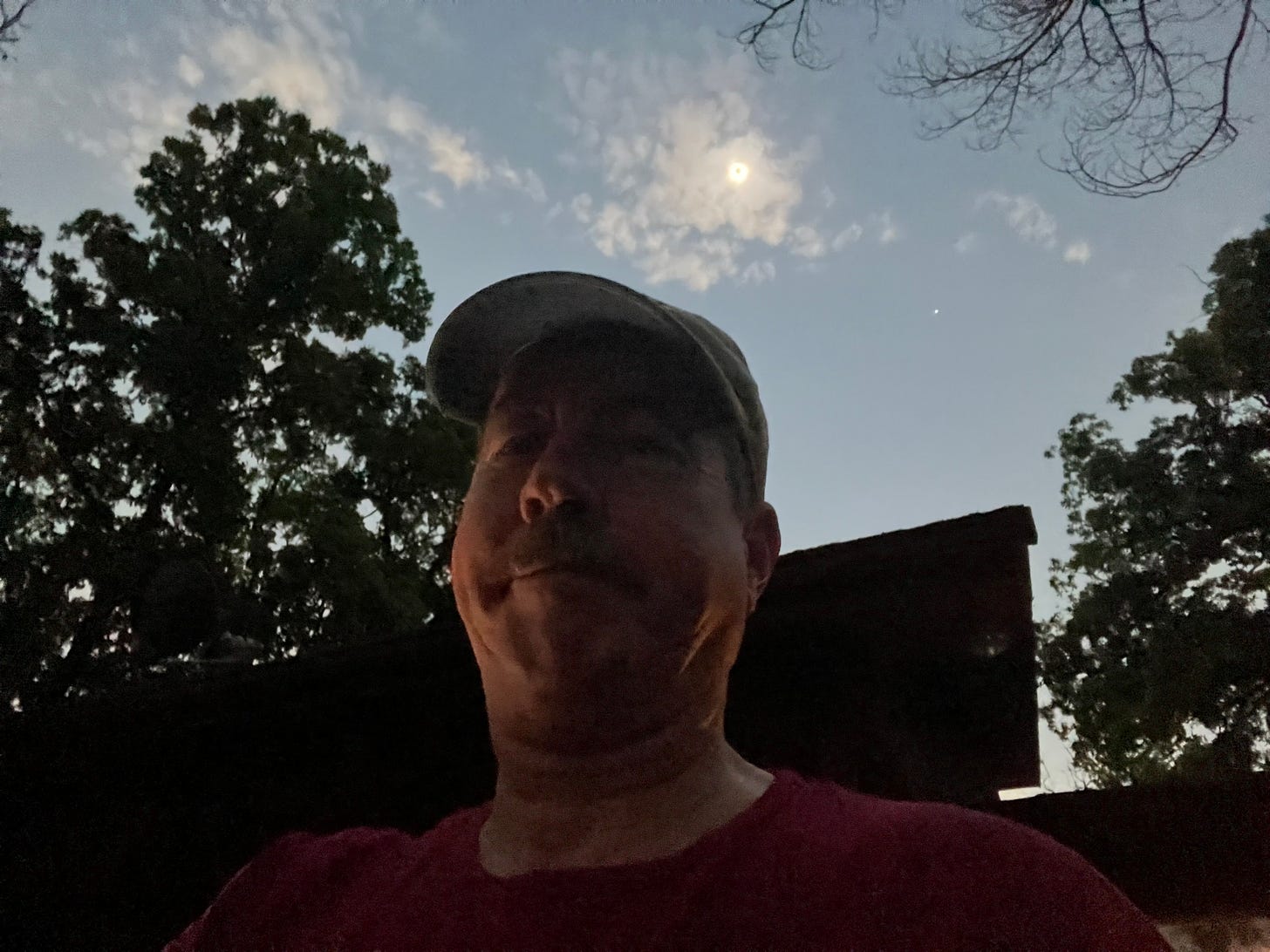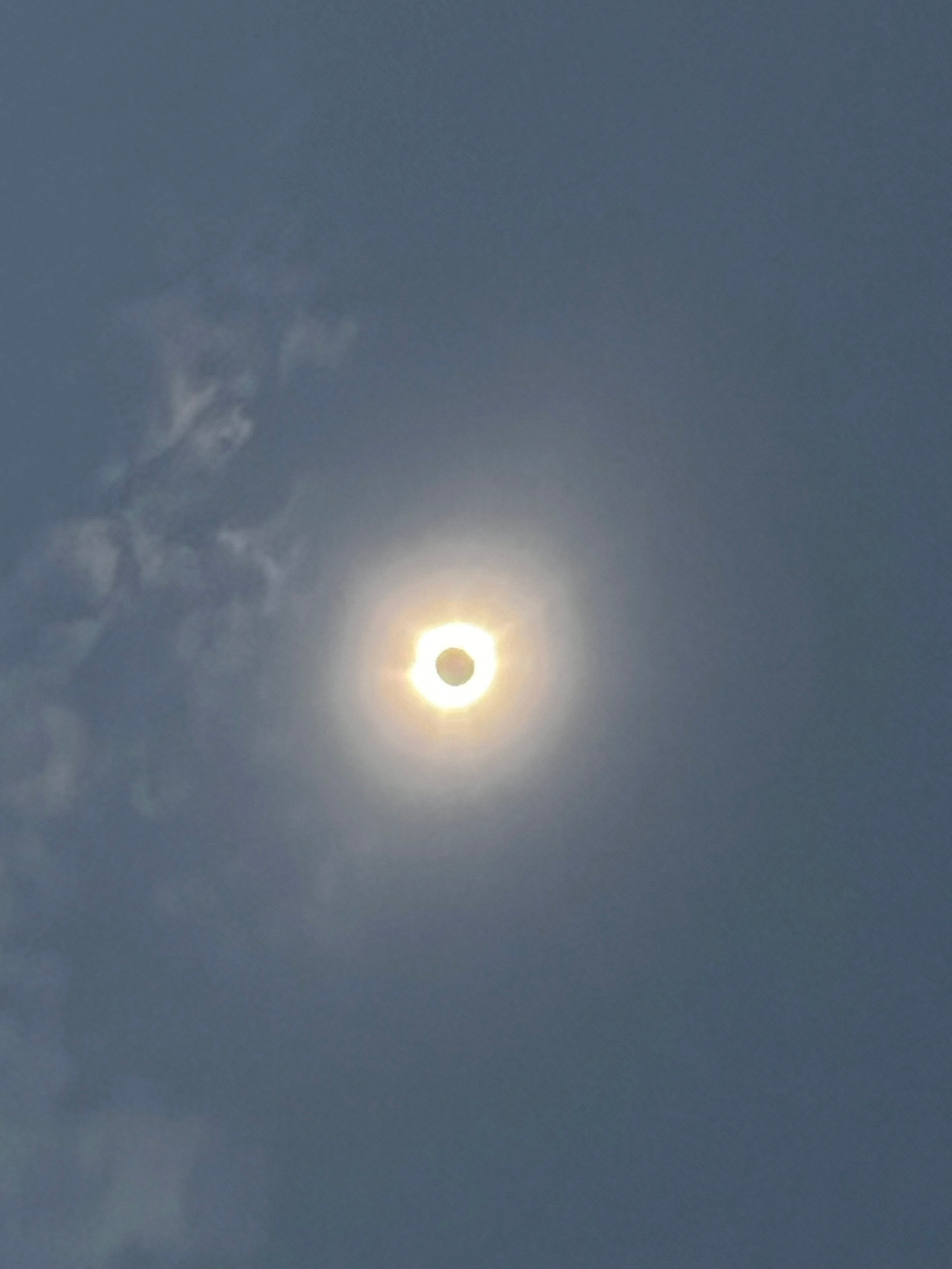What makes a book compelling? Join me in reading good books and honing the craft of writing.
Transcript:
This is Trials By Writing, a newsletter about what makes a book compelling. Join me in finding good books and honing the craft of writing.
By Geoff Mantooth
Today’s Newsletter: An Eclipse
Essay: Even Though We Predicted It, We’re Not So Smart
It’s April 8, 2024 and I’m in the path of the solar eclipse. The moon is creeping in front of the sun and soon will be at totality, which is a scientific word of saying not all sunlight will be blocked.
I’m outside, and in a most amateurish way, have tried shielding the microphone from wind noise. You’re likely to hear background.
While we wait for the moon to move into position, I‘ll talk about a couple of things. One is the need to center ourselves in even unusual situations. The other is the conceit of science, or at least our understanding of science. The two are related.
Beginning with centering ourselves, the path of the eclipse totality can be seen as a strip of shadow crossing part of the country. The strip is about 120 miles wide, a considerable width. As shown on the maps, a narrow centerline runs along the strip, representing the middle of totality.
By circumstance, we live along the path. But not the centerline. I, of course, suggested we go to Ennis, a relatively small town outside of Dallas and along the centerline, to view the eclipse. Debbie, my wife, said the traffic would likely be miserable, as many would come out of the Dallas area to see the eclipse. I hate traffic and have learned to trust what she says. So, we’re not in Ennis, but in the comfort of our backyard, gazing up at the sky.
To be honest, sky gazing, if done for long periods, hurts the neck. We glance up, check on the moon’s progress, and return to look horizontally, or even better, look down as I’m reading a novel.
Being off center means, and here, insert in your mind, a symphonic score in the background to emphasize high drama, about a minute or two less totality. Instead of about four minutes, we’ll see less. I don’t have a stopwatch, so I won’t have any idea how long it is.
So, we’ve cost ourselves a few dozen seconds. Also, to be honest, clouds are between us and the sun. Normally we welcome clouds, as Texas has the clearest skies. Skies so clear, the Army sited numerous air bases during World War 2. But not today, a day of days.
It’s early afternoon and it’s darker than normal. The moon shields about half the sun. The shadows are less distinct than we’re used to. This is the true experience of an eclipse. NASA will take better pictures of the eclipsed sun than I ever can. But, they won’t tell me how dark it’s getting right here.
A few years ago, we had a partial eclipse. Working in a multi-story office building, I descended to the ground floor, walked outside, the day taking on an orangish cast. Larry, a friend, kindly offered use of his safety glasses and I looked up at the partially occluded sun. We chatted, looked around and up. Glad I’d seen it, I went back to work.
In total eclipse on a cloudy day, the day is darker. Once in a while, the clouds clear and we can see the sun.
It’s near totality. Outdoor lights running on light sensors have switched on, fooled by the event. The few moments entering totality are dramatic, as the light disappears, as if deep twilight. The air temperature drops slightly, a comfortable day becoming even more so at midday. Before, I could see houses and trees far away. Now, I can still see the same things far away. I just have to strain the eyes a little. The clouds politely clear and I can see the ring around the moon. I take off my special eclipse viewing glasses to see; they are too dark.
We enjoy the moment of near nighttime during the mid part of the day. If we didn’t know what was happening, it would be easy to be scared, as the sun is blotted out.
Then the switch is thrown on and the light comes back, again dramatically.
It’s an accelerated daybreak and twilight, the twice daily ritual of the sun entering and leaving the stage. Clear skies or cloudy, the show goes on.
So, if you’re feeling on the outs by not living near the path of peak, if you didn’t want to fight the traffic to the centerline and away again, go outside this evening or tomorrow morning. With sunrise, there’s a promise of a new day. With sunset, a chance to reflect on a passing day, perhaps enjoy the night.
Which brings me to the second topic, the conceit of science.
It’s easy to feel superior because we predicted the time and place to view the peak eclipsing. Actually, very few of us did, because we relied on scientists. Earlier populations, without sufficient knowledge of the solar system orbital mechanics, couldn’t predict. With eclipses, we think we can predict most things.
Don’t get a big head. Science advances our knowledge of the world by positing a theory and waiting to see if the facts support the theory. Until a theory becomes accepted, like the prediction of eclipses, it’s a guess at nonfiction, aka, the truth. A healthy way to look at scientific theories is understand they begin the realm of fiction. The burden of proof is on those wanting to move it to nonfiction. Just like selling books with jacket copy and blurbs, many will try to convince us it’s nonfiction worth buying. And many will criticize, hoping to nudge it back to fiction.
For everyone who relies on others to tell us when and where the eclipse can be witnessed, it becomes confusing to sort the nonfiction from the fiction. Especially when the scientists use words like totality when it’s not total night, it’s only peak occlusion of the sun.
Case in point, the recent pandemic. The coronavirus was so new, we knew very few facts about it. Many people had a right to be scared of the unknown virus. As the months went by, it became clear that while certain segments of the population, such as elderly, immune-compromised, exhibited a higher vulnerability, other segments did not. It’s become clear that for a small segment, long-Covid is a debilitating illness. When vaccines became available, it became clear that they performed as vaccines do, mitigate the risk of many, not all, people in contracting the illness and the severity of illness.
Yet, there were those who urged the theories of Covid were nonfiction far too rapidly. And there are those who urge they are fiction, even today.
Here’s my take. The fewer times I ask, “Explain it to me in lay terms,” the more likely I’ll be confused. The fewer times I challenge a scientist to be clear and accurate, the sloppiness of science remains.
Debbie was spot on in giving me perspective. Looks like we’re missing the post-eclipse traffic.
All the Best,
Geoff
If you enjoyed this post, please hit the heart “❤️” so others can find it. It’s at the bottom and at the top.







Geoff, even thought we live a few miles apart, we did not achieve totality. At the designated time of total darkness, there was just the Itty bitterest sun remaining. So took off the high dollar glasses to get a better view, and Ola still about blinded me. So a bit disappointed, but will catch it next time through this area.
I enjoyed the dry humor and the great job of using the English language to share life and thoughts. Must be that Aggie engineering training! Nice report on the event. For the 2017 eclipse, we traveled to South Carolina with the kids, saw the relatives, who took us to an old high school friend's farmhouse and pasture to enjoy the "totality" of the event. It was as you described, mostly. We saw Venus in the background, all at 3:00 in the afternoon. For this 2024 event, I made myself a poor man's viewer by popping a round pinhole on paper with a pushpin. I went to the front porch, and saw the impressive crescent cast on the notepad. My son was interested for a whole second! But it verified for me some truth, you know, that the media wasn't really lying this time.
Now that I broached the subject, I read a good article today by journalist Uri Berliner from NPR. His point was that their audience is diminishing because, in his opinion, the public has lost trust in the organization. It was a truth thing, about not being accountable by going along with reporting untruthful stories, but not coming clean when the truth was finally learned. That's true for me. Back in the '90s, I would listen to Bob Edwards bring in Morning Edition to us getting ready for work, and in the car, with that musical intro from BJ Leiderman. I liked it so much I used to play it on our piano. But I stopped listening gradually. I started hearing some ideology between the lines of their reporting. Here's Uri's article: https://www.thefp.com/p/npr-editor-how-npr-lost-americas-trust . John